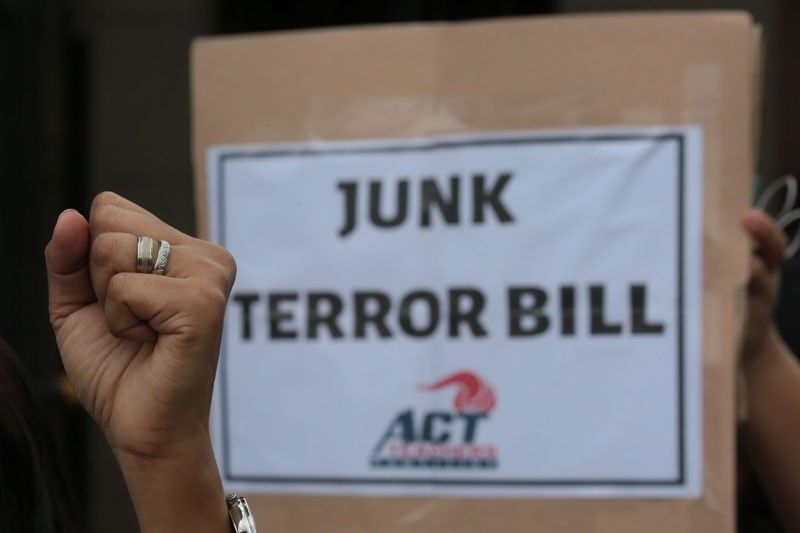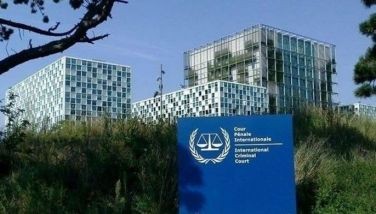Anti-terror bill critics can go to court — Palace

MANILA, Philippines — Groups opposed to the Anti-Terrorism Bill are free to question it before the courts even after its enactment into law, Malacañang said yesterday, as calls mount for President Duterte to veto the measure due to fears that it may lead to abuses.
“The truth is, once it becomes a law, they (critics of the bill) can still file cases because our judiciary is functioning. If there is a provision that violates the Constitution, it would be declared unconstitutional,” presidential spokesman Harry Roque said at a press briefing.
Various sectors have urged Duterte to reject the measure, saying it can be “weaponized” against critics of the government as it contains an unclear definition of “terrorism” that can spawn human rights violations.
One of the groups that have criticized the bill is the Integrated Bar of the Philippines, which questioned the provisions creating the Anti-Terrorism Council and allowing the detention of suspected terrorists for 14 to 24 days without judicially charging them.
The Catholic Bishops’ Conference of the Philippines-Committee on Basic Ecclesial Communities has also voiced its opposition to the bill, saying it contains provisions that are “reprehensive” to the rights of citizens.
Various academic institutions and cause-oriented groups have also expressed fear that the measure would be used to stifle free expression.
Roque cited the case of David vs. Arroyo, wherein an act of then president Gloria Macapagal-Arroyo was declared unconstitutional because there was no definition of terrorism at the time.
“The difference is terrorism now has a definition not just in the Philippines but also in the UN (United Nations) system. So it is very hard to win just like what happened to us during the David vs. Arroyo case,” he said.
The Anti-Terrorism Act, certified as urgent by the President, was transmitted to Malacañang for Duterte’s signature last Tuesday. Officials previously said the President’s legal team would conduct a final review of the measure before submitting it to him.
Roque reiterated that the bill has enough safeguards against human rights violations. With regard to the provision allowing the detention of suspected terrorists, Roque said law enforcers have to inform the nearest judge of their arrest of a suspected terrorist before filing appropriate charges.
“If the arrest is malicious, there is a corresponding imprisonment that lasts for up to 10 years,” Roque said.
Roque earlier said that Duterte’s decision on the bill would be “guided by what is best for the country.”
Prompt SC action
Chief Justice Diosdado Peralta promised to act promptly on any petition against the anti-terror bill, but stressed the process would depend on the nature of the petition.
“If there are issues factual in nature then we usually go to an oral argument but if the issues are merely, purely constitutional there’s no need to determine the factual issues then probably we just submit the case for decision based on the responses and pleadings of the parties,” Peralta told members of the media during the “CJ Meets the Press Online: Moving Justice Beyond the Pandemic” done via Zoom.
The magistrates may also have to take into consideration comments from the Office of the Solicitor General (OSG), he said.
Various groups are set to push through with their Independence Day protest rally against the anti-terrorism bill despite earlier warning by Interior Secretary Eduardo Año that they could be arrested as mass gatherings are still prohibited under the government’s quarantine protocol.
“The Mañanita protest will proceed by hook or by crook, and police are uninvited,” fisherfolk group Pambansang Lakas ng Kilusang Mamamalakaya ng Pilipinas (Pamalakaya) national chairperson Fernando Hicap said in a press statement.
“What the public would witness tomorrow is not a typical type of protest, but a Mañanita party with strict observance of the proper health protocols. We remind the police, who are not invited, to refrain from gatecrashing,” Hicap said.
By using the term mañanita, the protesters are apparently mocking National Capital Region Police Office chief Maj. Gen. Debold Sinas who avoided being punished for violating quarantine rules by claiming his birthday party was merely a manañita or a serenade by friends.
The Bagong Alyansang Makabayan (Bayan) also vowed to push through with their protest action.
“Lawyers have said that you cannot be arrested for peacefully exercising your rights, even during a pandemic. Quarantine violations are not basis for arrests. But the police are threatening arrests if you ‘disobey’ their commands. How does one ‘obey’ an illegal order?” Bayan secretary general Renato Reyes said.
“We urge all freedom-loving Filipinos to not let their voices be silenced despite machinations to sow fear. Let us continue to struggle for our rights and hard-won freedom,” Kapatan secretary general Cristina Palabay said.
The Commission on Human Rights (CHR) said the ongoing public health crisis does not prohibit the public from exercising their right to peacefully assemble.
“The Commission on Human Rights reiterates our stern reminder that the health crisis does not halt fundamental rights including freedom of peaceful assembly and activism,” CHR spokesperson Jacqueline de Guia said.
“While protecting health and safety are paramount in this time of pandemic, there cannot be a blanket restriction on basic rights and freedoms,” she added.
“Basic rights that enable citizens to seek redress for grievances, to contest policies and to express their opinions are equally crucial in a state of emergency towards a collaborative perspective in addressing the current social, economic and political uncertainties that beset our society,” she said.
Lingayen-Dagupan Archbishop Socrates Villegas is urging lawmakers to take a second look at the controversial anti-terror bill.
“I respectfully urge government then not to rush to the approval and enforcement of the law. I beg for a thorough re-study of the law, with as wide a base of consultation as possible while keeping to international standards,” Villegas said in a pastoral guidance.
While he acknowledged that the anti-terror law might have been based on similar laws in other countries, Villegas said it could not be a guarantee that it could “pass the bar of moral scrutiny.”
“Terrorism can never be the way of God. It cannot make any claim to be holy… We can and should resist terrorism – and at the same time take care that the State itself does not use terror on the citizens to banish terror from our country,” he said.
He added that the provisions defining terrorism and defining the crime of terrorism are “more troublesome.” – Robertzon Ramirez, Evelyn Macairan, Elizabeth Marcelo, Janvic Mateo
- Latest
- Trending






























